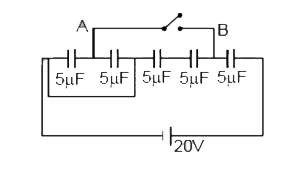A leaf electroscope is a simple apparatus to detect any charge on a body. It consist of two metal leaves OA and OB, free to rotate about O. Initially both are very slighty separted. When a charged object is touched to the metal knob at the top of the conduction re, charge flows from knob to the top of the conduction rod, charge flows from knob to the leaves through the conducting rod, charge flows from knob to the leaves through the conduction rod. As the leaves are now charged similarly, they start repelling each other and tet separted (deflected by certain angle).
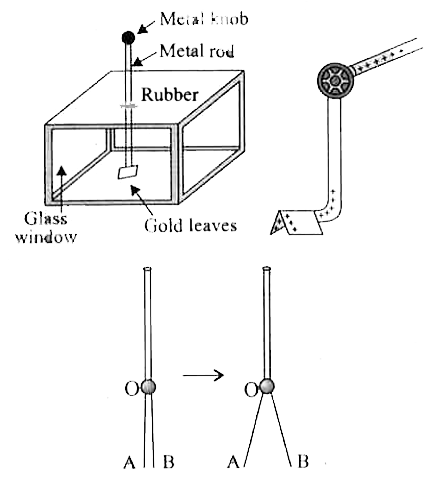
The angle of deflection in static equilibrium is an indicator of the amount of charge on the charged boy.
If we perform these steps one by one.
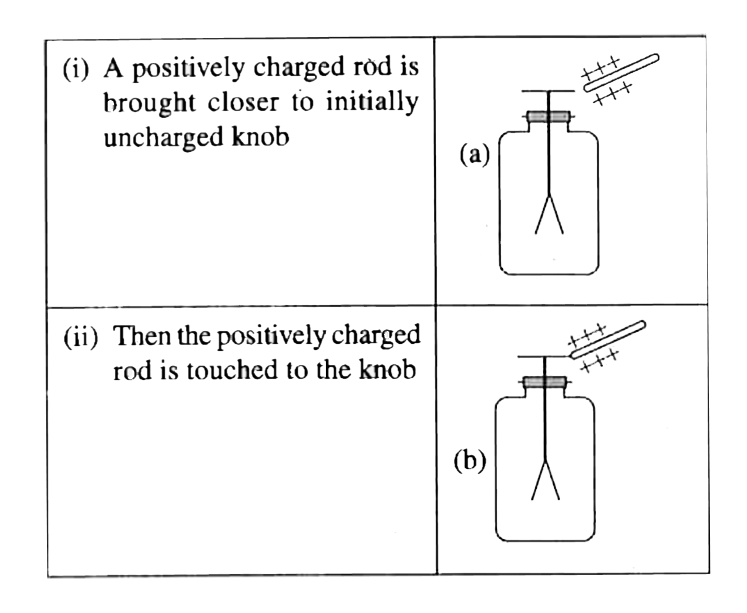
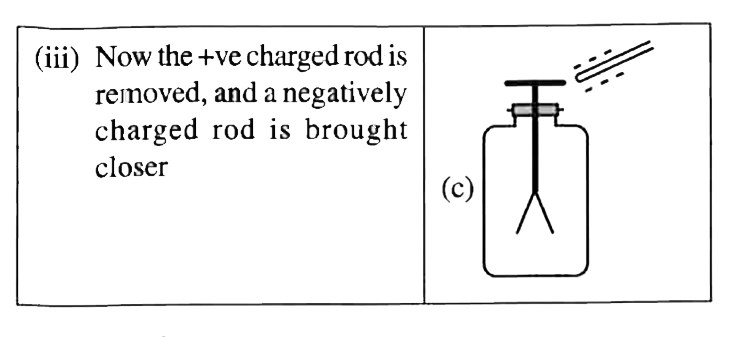
In which case, the leaves will converge (come closer), as compared to the previous state?
(i)
(i) and (iii)
only (iii)
In all cases, the leaves will diverge
The correct Answer is:C
Step by step video, text & image solution for A leaf electroscope is a simple apparatus to detect any charge on a body. It consist of two metal leaves OA and OB, free to rotate about O. Initially both are very slighty separted. When a charged object is touched to the metal knob at the top of the conduction re, charge flows from knob to the top of the conduction rod, charge flows from knob to the leaves through the conducting rod, charge flows from knob to the leaves through the conduction rod. As the leaves are now charged similarly, they start repelling each other and tet separted (deflected by certain angle). The angle of deflection in static equilibrium is an indicator of the amount of charge on the charged boy. If we perform these steps one by one. In which case, the leaves will converge (come closer), as compared to the previous state? by Physics experts to help you in doubts & scoring excellent marks in Class 12 exams.
Updated on:21/07/2023Topper's Solved these Questions
- ELECTROSTATICSBOOK - RESONANCECHAPTER - ELECTROSTATICSEXERCISE - Exercise - 3 Part - I
34 Videos
- ELECTROSTATICSBOOK - RESONANCECHAPTER - ELECTROSTATICSEXERCISE - Part - II
23 Videos
- ELECTROSTATICSBOOK - RESONANCECHAPTER - ELECTROSTATICSEXERCISE - Part- II
20 Videos
- ELECTROMAGNETIC INDUCTIONBOOK - RESONANCECHAPTER - ELECTROMAGNETIC INDUCTIONEXERCISE - A.l.P
19 Videos
- EXPERIMENTAL PHYSICSBOOK - RESONANCECHAPTER - EXPERIMENTAL PHYSICSEXERCISE - PART -II
10 Videos
Similar Questions
Knowledge Check
A leaf electroscope is a simple apparatus to detect any charge on a body. It consist of two metal leaves OA and OB, free to rotate about O. Initially both are very slighty separted. When a charged object is touched to the metal knob at the top of the conduction re, charge flows from knob to the top of the conduction rod, charge flows from knob to the leaves through the conducting rod, charge flows from knob to the leaves through the conduction rod. As the leaves are now charged similarly, they start repelling each other and tet separted (deflected by certain angle).
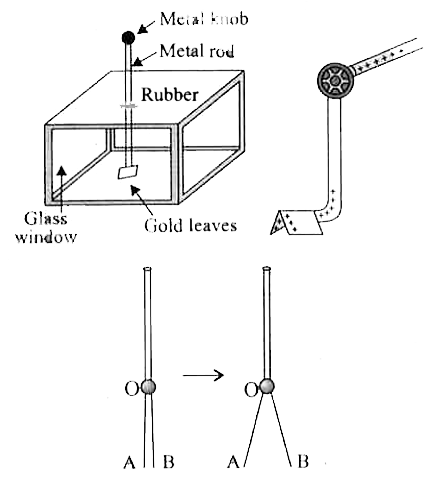
The angle of deflection in static equilibrium is an indicator of the amount of charge on the charged boy.
When a+20C rod is touched to the knob, the deflection of leaves was 5∘, and when an identical rod of −40C is touched, the deflection was found to be 9∘. If an identical rod of +30C is touched, then the deflection may be:A0B2∘C7∘D11∘A leaf electroscope is a simple apparatus to detect any charge on a body. It consists of two metal leaves OA and OB, free to rotate about O. Initially both are very slightly separated. When a charged object is touched to the metal knob at the top of the conducting rod, charge flows knob to the leaves through the conducting rod. As the leaves are now charges similarly, they start repelling each other and get separated, (deflected by certain angle).

The angle of deflection in static equilibrium is an indicator of the amount of charge on the charged body.
When a + 20 C rod is touched to the knob, the deflection of leaves was 5∘, and when an identical rod of -40 C is touched, the direction was found to be 9∘. If an identical rod of +30 C is touched, then the deflection may be :A0B2∘C7∘D11∘A leaf electroscope is a simple apparatus to detect any charge on a body. It consists of two metal leaves OA and OB, free to rotate about O. Initially both are very slightly separated. When a charged object is touched to the metal knob at the top of the conducting rod, charge flows knob to the leaves through the conducting rod. As the leaves are now charges similarly, they start repelling each other and get separated, (deflected by certain angle).
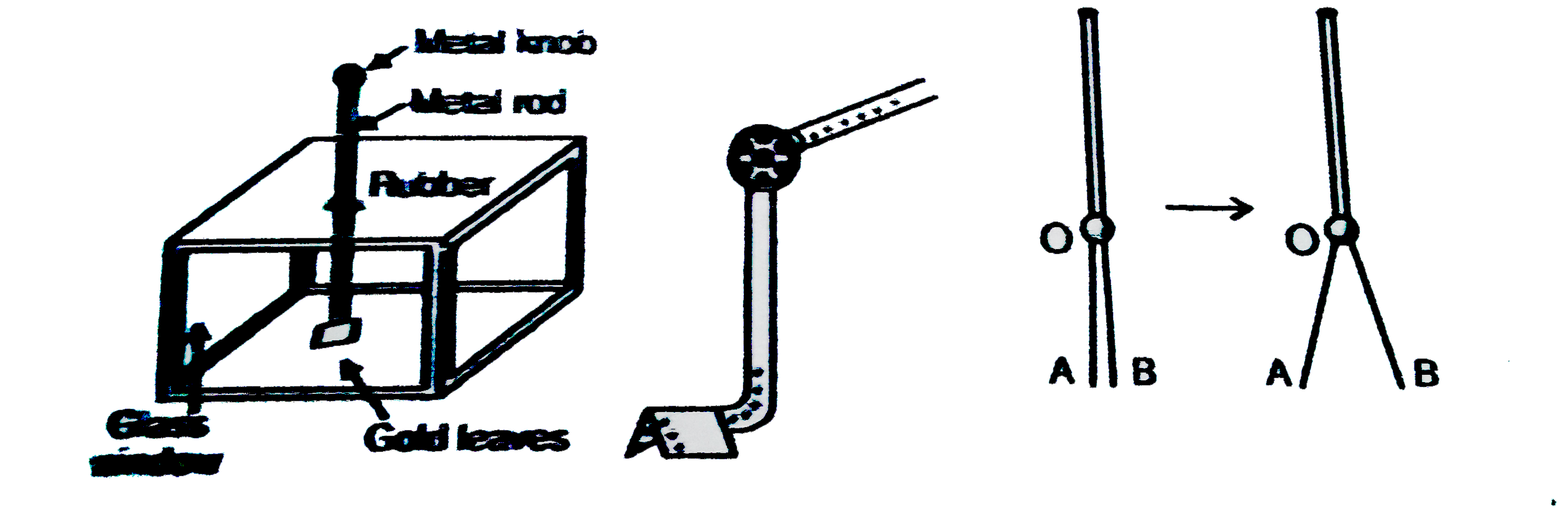
The angle of deflection in static equilibrium is an indicator of the amount of charge on the charged body.
In an electroscope, both leaves are hinged at the top point O. Each leaf has mass m, length l and gets charge q. assuming the charge to be concentrated at ends A and B only, the small angle of deviation (θ) between the leaves in static equilibrium, is equal to :A(2kq2l2mg)1/3B(kq2l2mg)1/3C(2kq2l2mg)1/2D(64kq2l2mg)1/3
A positively charged object is kept near a metallic object. If we connect the metallic object to earth, then describe how charge flows.
View SolutionCharge flows between two ends of a conductor when
View SolutionWhen two charged bodies at different potentials are connected by a conducting wire, then the charge flows from one body to another body
View SolutionWhen two isolated conductors A and B are connected by a conducting wire positive charge will flow from .
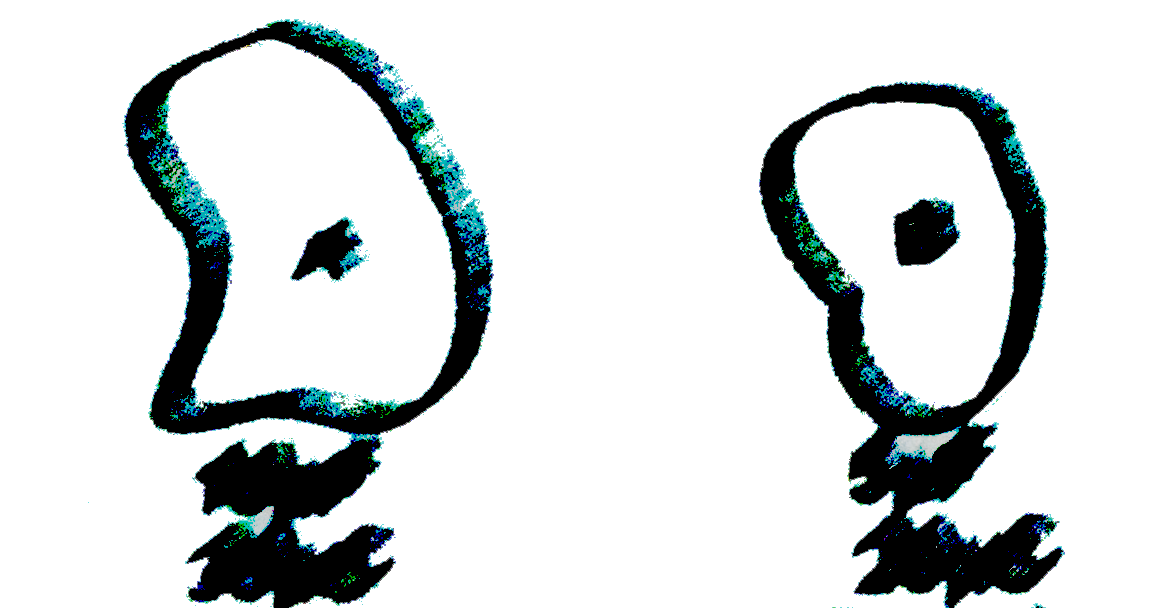
View SolutionWhen an object is touched with the metal top of an electroscope, its aluminium leaves diverge. What conclusion do you get from this observation ?
View Solution

